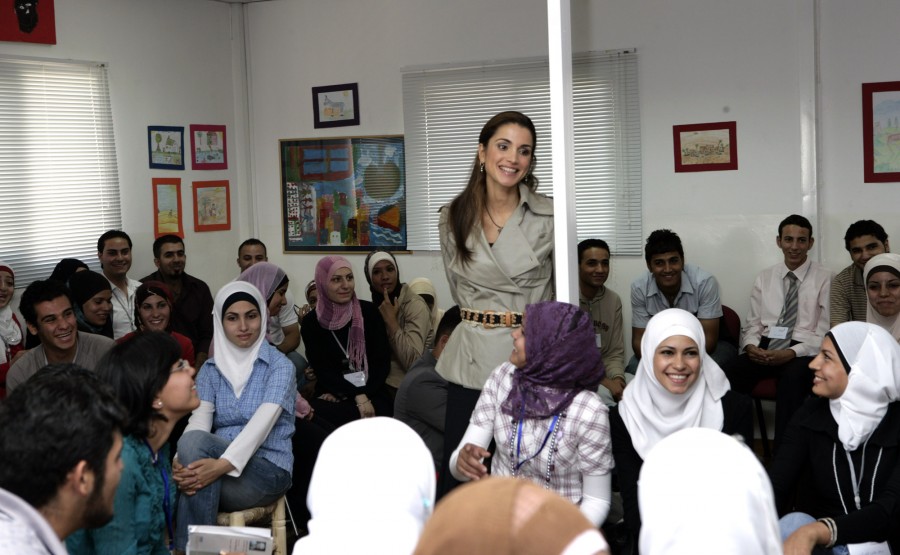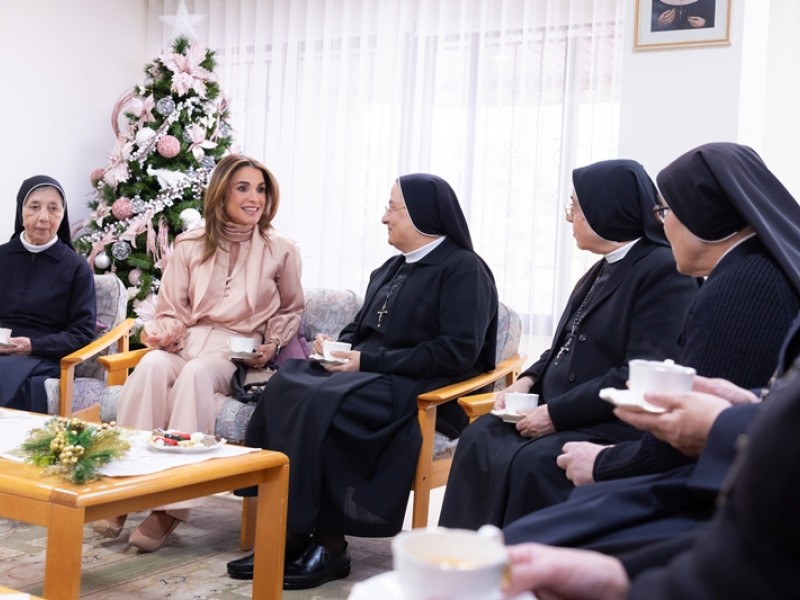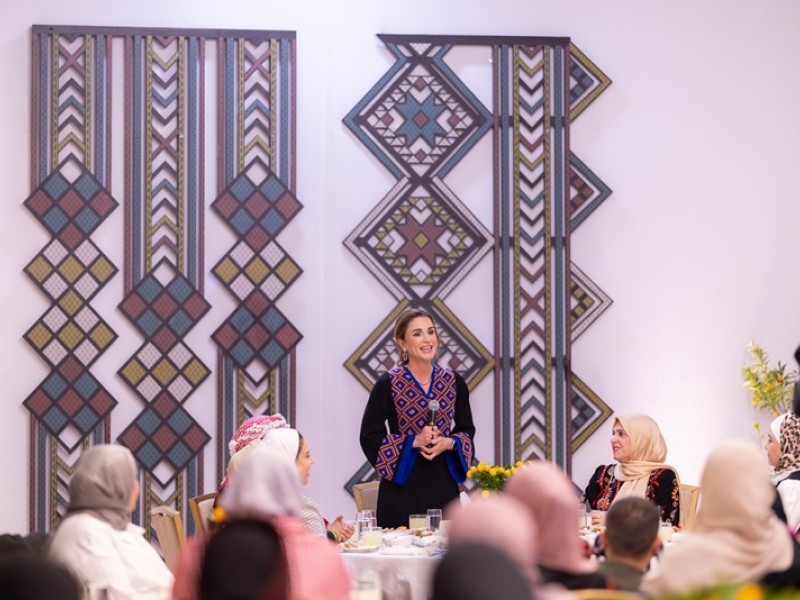Queen Rania Visits Jabal Al Natheef

(Jordan Times, Linda Hindi - Amman) Remarkably, a central Amman neighbourhood known for poverty, crime, drugs and hard lives also harbours qualities some affluent areas need: community residents who incorporate volunteerism, solidarity and neighbourly love into daily routines.
The tough locality, “Jabal Al Natheef”, according to officials, suffers from high population density, drug-related violence and unemployment rates that are 50 per cent higher than the national average, coupled with high birthrates.
In 2005, after working in Jabal Al Natheef, the Jordan River Foundation (JRF) recognised the area’s urgent need for support and decided to bring in the private sector to set up a long-term development strategy to shore up residents.
The rule was not to sign funding cheques and then disappear, but rather to revive community spirit and stand with residents as they learn to voice their problems and aid themselves.
Her Majesty Queen Rania visited the area yesterday to show her support for the residents’ efforts and witness the progress they have achieved with the help of individuals and private companies.
Queen Rania’s first stop was at Al Karma Centre, which operates a JRF project that started in 1988. It includes a productivity kitchen and a computer lab that is run by locals, who train other neighbours. The kitchen, this year, prepares 1,600 daily meals that philanthropic individuals and firms buy and offer to the poor during Ramadan.
Al Karma IT centre provides training with certifications for all ages, offering an average of five packed classes a day. In addition, the Design Project employs 16 women and has contracts with 500 others to embroider traditional and contemporary home furnishings, gift items and fashion accessories.
Director of Al Karma Centre Amal Fitiani told The Jordan Times that the centre is always full. “We train on computers, the sewing machines are running and the kitchen is always dishing out food with a motherly touch,” she said.
All the women are making between JD150-300 a month for their products and since inception, more than 1,500 of them have benefited with over JD3 million paid to the beneficiaries.
More success stories across the street
Al Karma Centre paved the way for the Ruwwad Centre, a private sector-run project that operates across the street.
Ruwwad, according to the people in charge there, is the first organisation of its kind in Jordan, funded by individuals and private sector companies. It acts as a catalyst for members of marginalised communities tackling problems prioritised by them.
The director of Ruwwad, Raghda Butros, told The Jordan Times that the plan was to develop trust with the residents and learn what they need through the observation of recurring issues.
“For nearly a year I came to the area, sat in residents’ homes and found out what the core problems were. We found a real lack of government services, small homes forcing children to play in the streets, high divorce rates, single moms, school dropouts and unhealthy living conditions,” Butros said.
With Ruwwad dubbed as the “new community management”, the first post office for the area was opened recently, a police station a few days ago and a public health centre should be open and running by the end of the week.
The whole concept, however, would be idle without the near 250 community volunteers who work with the centre on a daily basis.
The volunteers handle most of the labour for several initiatives such as the “neighbours programme”, which responds to families in dire need of maintenance and renovations for their substandard living conditions. The centre provides materials, and labour is provided by the volunteers with the aid of Habitat for Humanity.
A 65-year-old area resident, Amina Abu-Ghaddareh, had her kitchen ceiling fall on her while she was making tea. The ceiling continued to collapse throughout the hallway; overall her home was falling apart.
“These nice young people came and fixed my entire home, which could have eventually killed my children. They even painted it inside and out and fixed my broken television set, may God reward them,” Abu-Ghaddareh said.
Among the many initiatives, old furniture is sent to the centre refurbished by youth and then sent back. Elderly persons who do not know they are entitled to health insurance have their information taken from them and then receive health cards. The children’s library sees around 150 children a day for tutoring, reading and interactive activities.
Attika elementary school in the neighbourhood was fully renovated, with added ventilation and all new furniture.
Abeer Abu-Rumman, an area resident and employee at the centre’s library, told The Jordan Times that word caught on fast and scores of children waited outside after school before the library was even open.
During Queen Rania’s tour of the centre, a mother of seven, Firyal Kanaan, explained to her that Ruwwad is a household name in the area and works to solve all kinds of problems.
She told The Jordan Times that the volunteers assisted in returning her daughter to high school, mediated to solve a clash between her elder children, while her younger children go to the centre daily after school to play and read.
Meanwhile, the centre has one key that guarantees the youth to keep coming: university scholarships.
“Two-hundred and twenty of the volunteers are being provided with full scholarships for their university or colleges. We assess each semester, if they are not doing the community work and keeping up their grades, their scholarships come into question,” Ruwwad board member Samir Murad said.
Murad’s company contributes to the funding of the centre, and as a philanthropist he has contributed to the poorer areas of Amman for 12 years. He said that his “passion to give” found the institutionalised method he was looking for.
“On their merit, no student has ever lost a scholarship. Academically, they do not need help; they are willing to do anything for good grades; they realise that education is their ticket to a better future,” Murad said.
They are not the majority as Jabal Al Natheef has 50 per cent fewer higher education graduates than the national average and a higher rate of school dropouts.
Student volunteers gathered at the centre to speak with Queen Rania and acquaint her with issues affecting their lives.
The students are eager to discuss subjects across the board like drugs and crime that need more police attention and local election candidates who buy their votes. “Once they get elected, their offices close for most of the day and their cellphones are turned off,” one student vented.
The Queen urged the students to group together and collectively pressure elected candidates to do what they promised.
“I am proud to see bright youth discussing important issues. But you must be the ones to instill change. You have many choices. Band together, get your community involved and make them listen to what you have to say,” she said.
A volunteer in her third year of finance and banking, 20-year-old Hiba Saleh, explained that the scholarship was one thing, but she has learned to love helping her community so much she feels she will never abandon this centre.
Abdullah Bargouthi, 19, agreed. “When we help our neighbours, we are helping our mothers, brothers and sisters,” he said.
The Ruwwad design programme is the fruit of the ARAMEX corporate social responsibility plan, in coordination with the local community and the government.
ARAMEX was the first corporation to jump on board to support the Jabal Al Natheef area and remains Ruwwad’s largest donor.
Featured
Queen Rania's official website
This website does not support old browsers. To view this website, Please upgrade your browser to IE 9 or greater
Your browser is out of date. It has known security flaws and may not display all features of this and other websites. Learn how to update your browser



